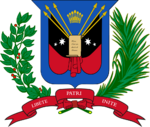Senate of Carucere: Difference between revisions
mNo edit summary |
No edit summary |
||
| Line 42: | Line 42: | ||
'''Opposition''' | '''Opposition''' | ||
*{{Color box|#FF6600|border=black}} [[National Party of Carucere|NPK]] (9) | *{{Color box|#FF6600|border=black}} [[National Party of Carucere|NPK]] (9) | ||
*{{Color box|#EDAD08|border=black}} [[National Labour Party (Carucere)|PNT]] (3) | *{{Color box|#EDAD08|border=black}} [[National Labour Party (Carucere)|PNT]] (3) | ||
*{{Color box|#89cff0|border=black}} [[Reformed Social Party|PSR]] (2) | |||
|political_groups2 = | |political_groups2 = | ||
|committees1 = | |committees1 = | ||
| Line 63: | Line 63: | ||
The '''Senate of Carucere''' ({{wp|French langauge|Gaullican}}: ''Sénat de Caruquère'', [[Papotement]]: ''Senat Karuku'') is the primary {{wp|legislature|legislative body}} of [[Carucere]]. The Senate is composed of 79 members, who are directly elected for 4-year terms by regional {{wp|proportional representation}}. It is one of two legislative bodies on the national level, the other being the [[National Assembly of Carucere|National Assembly]]. | The '''Senate of Carucere''' ({{wp|French langauge|Gaullican}}: ''Sénat de Caruquère'', [[Papotement]]: ''Senat Karuku'') is the primary {{wp|legislature|legislative body}} of [[Carucere]]. The Senate is composed of 79 members, who are directly elected for 4-year terms by regional {{wp|proportional representation}}. It is one of two legislative bodies on the national level, the other being the [[National Assembly of Carucere|National Assembly]]. | ||
The Senate was established by the Constitution in 1972 as the country's supreme legislative body, following the concept of {{wp|parliamentary sovereignty}}. However | The Senate was established by the Constitution in 1972 as the country's supreme legislative body, following the concept of {{wp|parliamentary sovereignty}}. However economic and political infighting weakened the authority of the Senate, after a succession after several weak [[Preimer of Carucere|Preimers]]. [[Jean Preval]]'s {{wp|self-coup}} and following constitutional reforms effectively ended the Senate's absolute powers. Its role further changed with the establishment of the [[National Assembly of Carucere]] as a second legislative body on the federal level. | ||
Today, the Senate usually exercises a secondary, albeit important, role in national politics. The Senate has the final authority on all legislation. In addition it must approve appointment of the [[Cabinet of Carucere]] and the [[Premier of Carucere]] and grants authorization to presidential decrees. In addition, it maintains many supervisory powers such as the power to {{wp|Impeachment|impeach}} officials, dismiss the [[Premier of Carucere|Premier]] and the [[Premier of Cabinet|Cabinet]] by a majority vote, impeach and remove the President, and to dissolve itself and call new elections. Until an election is completed, the Senate and thus the President, maintains authority in its current composition. | |||
Revision as of 02:09, 26 February 2023
Senate of Carucere Sénat de Caruquère Senat Karuku | |
|---|---|
 | |
| Type | |
| Type | |
| History | |
| Founded | 2 February 1972 (52 years ago) |
| Preceded by | Provincial Senate of Carucere |
| Leadership | |
| Structure | |
| Seats | 79 members |
 | |
Political groups | Government
Confidence and Supply
Opposition |
| Elections | |
| Closed list proportional representation | |
Last election | 23 August 2022 |
Next election | By 2026 |
| Meeting place | |
 | |
| Red House, Kingston, Carucere | |
The Senate of Carucere (Gaullican: Sénat de Caruquère, Papotement: Senat Karuku) is the primary legislative body of Carucere. The Senate is composed of 79 members, who are directly elected for 4-year terms by regional proportional representation. It is one of two legislative bodies on the national level, the other being the National Assembly.
The Senate was established by the Constitution in 1972 as the country's supreme legislative body, following the concept of parliamentary sovereignty. However economic and political infighting weakened the authority of the Senate, after a succession after several weak Preimers. Jean Preval's self-coup and following constitutional reforms effectively ended the Senate's absolute powers. Its role further changed with the establishment of the National Assembly of Carucere as a second legislative body on the federal level.
Today, the Senate usually exercises a secondary, albeit important, role in national politics. The Senate has the final authority on all legislation. In addition it must approve appointment of the Cabinet of Carucere and the Premier of Carucere and grants authorization to presidential decrees. In addition, it maintains many supervisory powers such as the power to impeach officials, dismiss the Premier and the Cabinet by a majority vote, impeach and remove the President, and to dissolve itself and call new elections. Until an election is completed, the Senate and thus the President, maintains authority in its current composition.